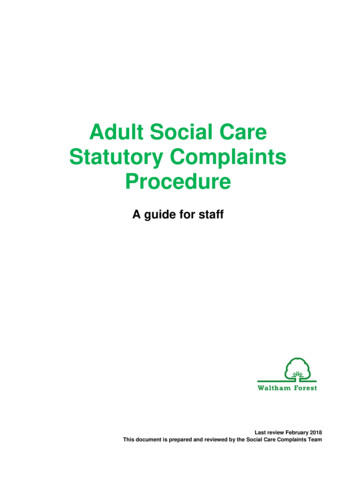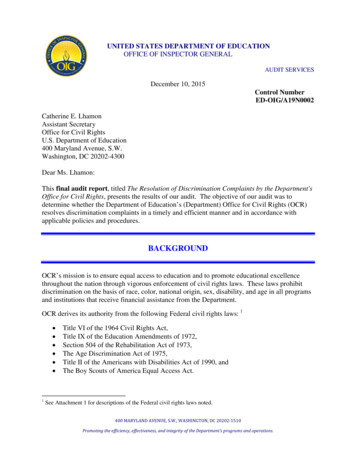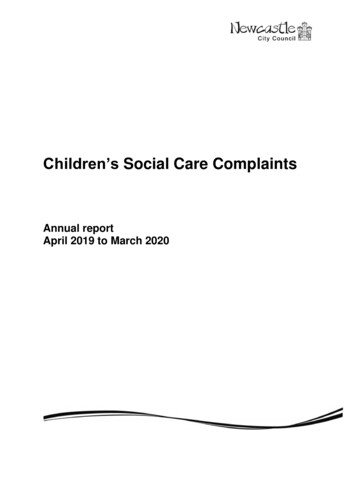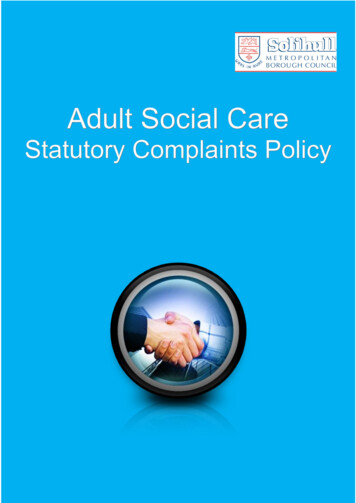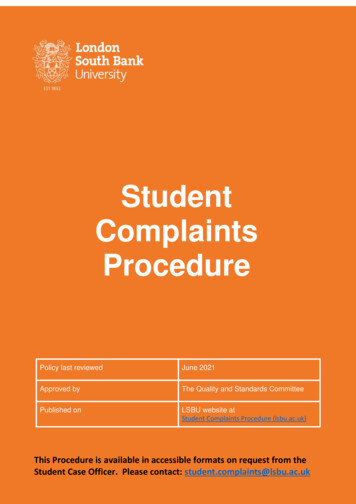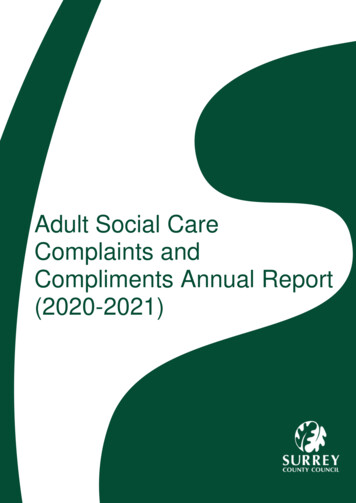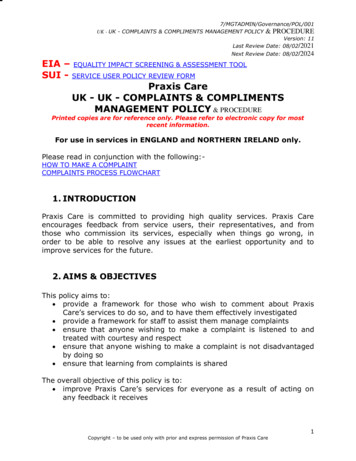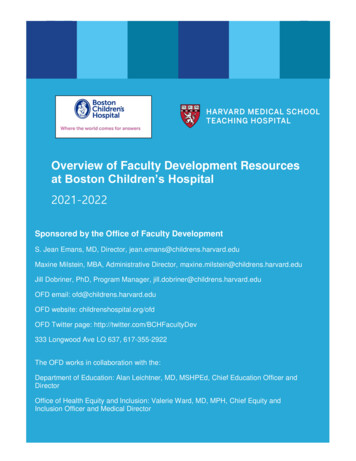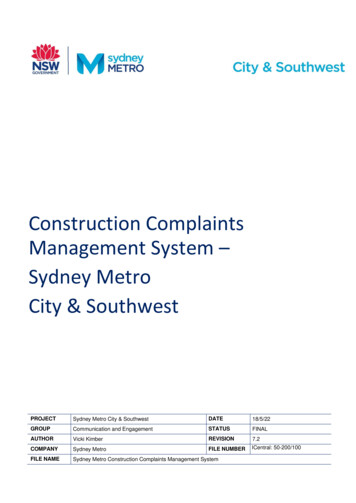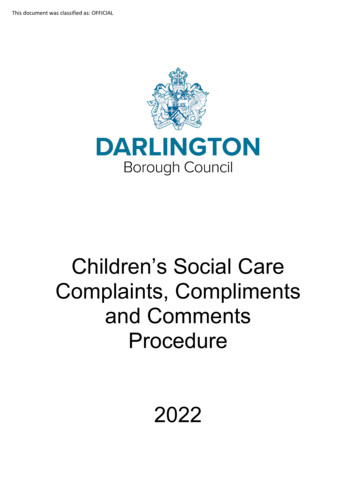
Transcription
This document was classified as: OFFICIALBorough CouncilChildren’s Social CareComplaints, Complimentsand CommentsProcedure2022
This document was classified as: OFFICIALContentsIntroduction. 3Complaint and Information Governance Team . 4Making a Complaint. 5What is a complaint? .5Staff Behaviour and Attitude*.5Services Provided on behalf of the Council.5How to Make a Complaint .6Who can complain? .6Help Making a Complaint.6Involvement of councillors and MPs in the procedure .6Consent .7Anonymous Complaints .7Compliments and Comments . 7Compliments.7Comments.7The Complaints Process. 8 Stage 1: Informal Resolution.8 Stage 2: Formal Investigation .8 Stage 3: Complaint Review Panel .8Putting things Right .9Referring your complaint to the Ombudsman .9Withdrawing a Complaint .9When you cannot use this Procedure. 10Non-Qualifying Complaints .10Legal Proceedings .10Insurance Claims.10Time Limit .11Safeguarding. 11Accessibility and Equal Opportunities . 11Public Information.12Satisfaction Surveys .12Unreasonable and Unreasonably Persistent Complainants . 12Record Keeping and Data Sharing. 12Further Information . 132
This document was classified as: OFFICIALIntroductionOur aim is to put you first and provide you with the best possible service. Tomake this aim a reality it is important that you tell us what you think about theservices we provide. The Children’s Social Care Complaints, Complimentsand Comments Procedure is one way you can do this. You can tell us whenwe get things wrong so we can put them right. You can also tell us when weget things right, make comments about the things we do and suggest newways of doing things.We understand that sometimes it is difficult to complain and may be able toarrange an advocate should you need help making your complaint. If you doneed to make a complaint we will take your concerns seriously. We will treatyou fairly and with respect and you can be confident that you will not receive apoorer service as a result. If we uphold your complaint you can expect anapology and for us to put things right quickly. What we ask in return is thatyou treat our staff with respect. In addition to resolving your complaint we willuse the information we gather on complaints to help us improve the serviceswe provide.This procedure sets out how we will deal with your complaints in line with theChildren Act 1989 Representations Procedure (England) Regulations 2006. Italso sets out how we will deal with your compliments and comments. Our aimis to resolve your complaint and put you back in the position you would havebeen in before having to make the complaint.This procedure has three stages in relation to complaints. We will try toresolve the majority of complaints at Stage 1. At Stage 1 a manager from theservice you are complaining about will usually respond to your complaint andtry to put things right. If you are not happy with the outcome you can ask foryour complaint to be investigated at Stage 2 where an Investigating Officer(independent of the service) and Independent Person are appointed to lookinto your complaint. If you are still unhappy with the outcome, you canrequest that your complaint is independently reviewed at Stage 3 by aComplaints Review Panel. For more information regarding the stages of theprocedure, please see page 7.The Assistant Director Children’s Services will act as the Adjudicating Officer,which means they will make any important decisions on complaints andensure that action is taken if necessary in the light of the outcome of yourcomplaint.The Complaints and Information Governance Manager is the responsibleperson for managing the procedures for handling and considering complaintsin accordance with the agreements made under the regulations.3
This document was classified as: OFFICIALComplaint and Information Governance TeamThe Complaints and Information Governance Team is a single point ofcontact for anyone wishing to make a complaint. It oversees all Children’sSocial Care Complaints and provides advice and information tocomplainants, members of staff and Councillors in relation to complaints.The Complaints and Information Governance Team can provide informationabout the complaints procedure in other formats and help arrange advocatesand interpreters. The Complaints and Information Governance Team canalso provide advice on the support available for staff involved in complaints.The Complaints and Information Governance Team records andacknowledges all complaints made to the Council. It provides support toInvestigating Officers and monitors the progress of complaint investigations.The Complaints and Information Governance Team uses the information itcollects about complaints to identify any topics and trends to help improveservices and is responsible for producing the annual report on complaints,compliments and comments received under this procedure.The Complaints and Information Governance Team also carries outcustomer satisfaction surveys to ensure the people of Darlington are satisfiedwith the way we handle their complaints.The Complaints and Information Governance Team is also the central pointof contact for the Local Government and Social Care Ombudsman.You can contact the Complaints and Information Governance Team bytelephone, text, e-mail, via our website, in writing, via video call, in person orby any other reasonable means. Please see contact details below.Complaints and Information Governance TeamTelephone: (01325) 406777Text: 07852 715 241E-mail: complaints@darlington.gov.ukComplaints and Information Governance TeamDarlington Town HallDarlingtonDL1 5QTN.B. Please arrange an appointment prior to visiting to ensure someoneis available to meet with you.4
This document was classified as: OFFICIALMaking a ComplaintWhat is a complaint?This procedure is specifically for making complaints about children’s socialcare services. Darlington Borough Council defines a complaint as:“When someone tells us they are not happy about a service or something wehave or have not done that has had an impact upon them”The procedure is designed to cover things like: The way an assessment has been carried out;a decision you are not happy with;a problem with the service you are receiving;delays in making decisions or providing services; andattitude or behaviour of staff*;This list does not cover everything but provides a good idea of the kinds ofcomplaints the Council might receive.Staff Behaviour and Attitude*If your complaint is solely about the attitude or behaviour of a member of staffit may be appropriate to investigate the matter under Council’s employmentprocedures. Where this is the case we will let you know how we will deal withthe matter, however, due to the confidential nature of employer-employeerelations we will not be able to provide you with details of the outcome.Services Provided on behalf of the CouncilIf your complaint is about a service provided on our behalf you may make acomplaint to us or directly to the organisation providing your service. If wereceive the complaint we will ask for your consent to pass it to theorganisation to deal with in the first instance. If you are dissatisfied with theresponse from them we can then look into the matter. If you have anyconcerns about this you can discuss them with the Complaints Manager.If your complaint is in part about the standard of a service provided on ourbehalf and in part about a service provided by us, for example yourassessment, we will contact you to let you know which part of the complaintwill be handled by us and ask for your consent to forward the other elementsof your complaint to the organisation providing the service. In such cases wewill work with the organisation and provide you with one response covering allof the issues raised were possible.5
This document was classified as: OFFICIALHow to Make a ComplaintYou can make a complaint in person, in writing, by e-mail, via our website,over the phone, via our text service or by any other reasonable means. Youcan speak to any member of staff or you can contact the Complaints andInformation Governance Team directly (contact details on page 4). Whoeverreceives your complaint should forward it to the Complaints and InformationGovernance Team on the day of receipt.Complaint forms are available in every Council building and on our website.You can email: complaints@darlington.gov.uk or use our online complaintsform which you will find at: www.darlington.gov.uk/complaintsWho can complain?You can use this procedure to complain if you are receiving support fromChildren’s Social Care or acting on behalf of someone receiving support. Insome cases you may be able to make a complaint even if you are not directlyin receipt of services.The Complaints Manager will decide whether or not your complaint should bedealt with under this procedure. If the Complaints Manager decides it wouldnot be appropriate to deal with your complaint under this procedure they willinform you of the reasons why and explain how we will deal with the matter.Help Making a ComplaintIf you need some help to make your complaint the Complaints and InformationGovernance Team may be able to arrange an advocate for you. An advocateis someone who can speak on your behalf.You might prefer a friend or relative to make a complaint on your behalf. Ifsomeone is complaining on your behalf you must tell us you have given yourconsent for us to share your personal information with them.Involvement of councillors and MPs in the procedureIf you have any concerns it may be helpful to discuss them with your localcouncillor. Your councillor can help you decide on the best course of action.This may involve putting you in touch with the appropriate council officer ormaking an enquiry on your behalf.In cases where you need to make a complaint your councillor should refer youto the Complaints and Information Governance Team. They can make acomplaint on your behalf and support you through the process. If yourcouncillor does make a complaint on your behalf we will copy them in to allcorrespondence unless they request otherwise.Whether or not you seek advice from a councillor you can expect a highquality service.6
This document was classified as: OFFICIALThe same principles will apply where you make your complaint via yourMember of Parliament (MP).ConsentIf you are making a complaint on behalf of another adult we will need theirconsent to investigate it and share their information with you. We will alsoconsider whether or not you are acting in the person’s best interest beforeinvestigating the complaint. We will not usually investigate the complaint untilconsent is received.If you are making a complaint on behalf of a child or young person, we willneed to confirm where appropriate that the child or young person is happy forthis to happen and that the complaint is an accurate reflection of their views.Anonymous ComplaintsIf you make an anonymous complaint we will consider the matter but we willnot be able to provide you with a response. If you do not want to give yourname because you are worried that it might affect the service you receive,please be assured this will not be the case. Following consideration of ananonymous complaint the Adjudicating Officer will decide what, if any actionsshould be taken as a result of the investigation.Compliments and CommentsComplimentsCompliments can help us share good practice and improve services.If you pay someone a compliment in person they will pass the details on to theComplaints and Information Governance Team to be recorded.If you pay someone a compliment via the Complaints and InformationGovernance Team, we will record it, send you an acknowledgement and passit on to the appropriate person.CommentsComments are also a great way of sharing your ideas about particular projectsor services in general. If you pass your comments on to a member of staffthey will pass the details on to the Complaints and Information GovernanceTeam to be recorded.If you make a comment via the Complaints and Information GovernanceTeam, we will record it, send you an acknowledgement and pass it on to theappropriate service.Where a response is required the service will provide one within 25 workingdays of the date we receive your comment.The Complaints and Information Governance Team will record any actionstaken as a result of your comment.7
This document was classified as: OFFICIALThe Complaints ProcessIf you make a complaint verbally and it is resolved immediately we will not usethis procedure. If the complaint is received in writing, however, we will alwaysprocess it through this procedure.The complaints process has three stages, each of which has a set timescale: Stage 1: Informal Resolution10 working days (up to 20 working days)The aim of Stage 1 is to resolve your complaint quickly and informally.The team manager will be in the best position to respond to yourcomplaint at Stage 1 as they are actively supervising your case and willbe familiar with your history. If you are complaining about the teammanager we will usually ask their line manager to deal with yourcomplaint.If you are dissatisfied with the outcome of your complaint you can askfor it to be progressed to Stage 2 of the complaints procedure. Stage 2: Formal Investigation25 working days (up to a maximum of 65 working days)Stage 2 is the formal investigation stage. This will usually be done by amanager from a different service, they will be called the InvestigatingOfficer. The investigation must be overseen by an IndependentPerson, someone who is completely separate from the Council andwhose role it is to ensure that your complaint is investigated properlyand fairly. Occasionally complaints will be dealt with immediately atStage 2 because of the complexity or seriousness.The Investigating Officer will produce a draft report which they willshare with you. After doing so the Investigating Officer will finalise theirreport and the Independent Person will produce their report. They willsend their reports to the Adjudicating Officer. The Adjudicating Officerwill decide what action to take as a result of the findings and write toyou informing you of their decision. You will also be given a copy of theInvestigating Officer’s and the Independent Person’s reports.If you are dissatisfied with the outcome of your complaint you can askfor it to be heard by a Complaint Review Panel. Stage 3: Complaint Review Panel(Held within 30 working days, response within 15 working days of thepanel)8
This document was classified as: OFFICIALComplaint Review Panels are made up of three people who haveexperience in social care or related professions but who are completelyindependent from the Council.The panel will meet you and your representatives (where appropriate),the Investigating Officer, the Independent Person, the AdjudicatingOfficer and the Complaints Manager to review the adequacy of theStage 2 investigation. The panel will then make recommendations tothe Council in order to resolve your complaint.This is the last stage of the Council’s complaints procedure. If youremain dissatisfied with the outcome of the Complaint Review Panelyou can refer your complaint to the Local Government and Social CareOmbudsman.Putting things RightWhen you make a complaint we will ask you what you would like us to do toput things right. We will take your views into account but it may not always bepossible to give you exactly what you want. Where this is the case, we willdiscuss the matter with you and come to an agreement.If we uphold or partly uphold your complaint you can expect an apology andfor us to put things right quickly. We may also propose a number of otheractions. The aim of these actions is to put you back in the position you werein before the problem occurred and make amends for any loss you may havesuffered as a result. Although we will consider each complaint on its meritswe will try to ensure we offer similar remedies for similar situations.Remedies may include a review of our practices and procedures to ensurethat the same thing does not happen again, or we may take a specific action.Referring your complaint to the OmbudsmanYou can refer your complaint to the Local Government and Social CareOmbudsman at any time. However, the Ombudsman is unlikely toconsider your complaint unless we have investigated it fully under theChildren’s Social Care complaints procedure.Following a Stage 2 investigation, in a limited number of cases, theComplaints Manager may decide to make an early referral to the LocalGovernment and Social Care Ombudsman.Withdrawing a ComplaintYou can withdraw your complaint verbally or in writing at any time. If youdecide not to pursue your complaint, the Complaints Manager will write to youconfirming that your complaint has been withdrawn. A copy of the letter willalso be sent to the relevant service manager. In some cases we may still lookinto the issues you have raised outside the complaints process, for example,where there are safeguarding concerns or if there were areas identified wherepractice could be improved.9
This document was classified as: OFFICIALWhen you cannot use this ProcedureThe complaints regulations are very specific and not everything qualifies to bedealt with under them. Where your complaint falls outside of the remit of theregulations the Complaints Manager will advise you of how we will deal withyour complaint.Non-Qualifying ComplaintsThe following types of complaints do not qualify to be dealt with under thisprocedure: A complaint which is made verbally and is resolved immediately.A complaint that should be dealt with under another procedure, forexample, the Corporate, Adult Social Care or Housing ComplaintsProcedure.A complaint about matters which have been fully dealt with under thisor other appropriate procedures.A complaint about matters which are being or have been investigatedby the Local Government and Social Care Ombudsman.A complaint by an employee about any matter relating to theiremployment.A complaint about the handling of a request for information under theFreedom of Information Act or the Data Protection Act (although wecan investigate this under the Council’s Corporate ComplaintsProcedure).Legal ProceedingsYou cannot use this complaints procedure to challenge decisions of a Court.Where social work information or a social work report has gone to court youmay be able to make a complaint about its quality or accuracy separate to theactions of the Court. If we uphold your complaint we will advise you whataction we propose to take with regard to the Court action.We will not investigate complaints about the quality or accuracy of informationor reports provided in relation to private law proceedings. If you wish tochallenge such information or a report (known as a section 7 or section 37report) then the most appropriate way to do so is in court.If your complaint relates to ongoing legal proceedings or you or the Councilintends to take legal proceeding in relation to the substance of your complaintwe will deal with your complaint unless we decide that consideration of yourcomplaint will prejudice the conduct of those proceedings. We will take eachdecision based on the specific circumstances of the case.Insurance Claims10
This document was classified as: OFFICIALSome issues are more appropriately dealt with as insurance claims againstthe Council. Where this is the case we will inform you of our decision and thereasons for it.Time LimitWe will not usually look into your complaint if 12 months have passed sincethe date you learned that something went wrong. However, we may acceptyour complaint for one or more of the following reasons: You are a vulnerable person and did not complain because you wereconcerned about what might happen.We believe that there would be a benefit to you in looking into yourcomplaint.There is likely to be enough information available from the time theincident happened to enable an effective and fair investigation to becarried out.There are enough people available from the time the incidenthappened to enable an effective and fair investigation to be carried out.Where action needs to be taken in light of human rights basedlegislation.There may be other reasons why we would consider your complaint that arenot included in this list, we will consider each case on its merits.SafeguardingIf your complaint mainly involves concerns about a child’s safety we will dealwith it through Darlington Child Protection Procedures. If it is felt during acomplaints investigation that a child is at risk we will also follow our ChildProtection Procedures. Where possible we will continue investigating yourcomplaint, however, where the Complaints Manager feels that the complaintsinvestigation will interfere with the safeguarding investigation we will put yourcomplaint on hold until the safeguarding investigation has been concluded.Accessibility and Equal OpportunitiesWe are committed to making sure that everyone has equal access to all ourservices, including this complaints procedure. To help make sure ourcomplaints procedure is easily accessible we: use plain language;accept complaints in person, in writing, by e-mail, via our website, overthe phone, via our text service or by any other reasonable means;provide information and responses in Braille, large print, audio, easyread format and other languages where needed; andprovide translators (including sign language translators) where needed.11
This document was classified as: OFFICIALPublic InformationWe will provide information on how to make a complaint on our website. Wewill also make leaflets, including a young person friendly leaflet, available in allCouncil buildings.Satisfaction SurveysOnce we have dealt with your complaint we might ask you to complete asatisfaction survey. This is about how you feel we handled your complaint.For example, whether or not we kept you informed, met timescales and so on,it is not about the outcome of your complaint. We would appreciate you takingthe time to fill this in and help us improve the way we handle complaints.Unreasonably Persistent ComplainantsWe do not normally limit contact with our offices. However, if complainantsdisplay unreasonably persistent behaviour for example, they contact ouroffices so many times that it hinders our handling of their complaint, we maytake action to limit their contact. In these cases we will follow the Council’sUnreasonably Persistent Complainants Procedure.Record Keeping and Data SharingThe Complaints Manager will place a record on your electronic social carerecord to say that you have made a complaint. During the complaintinvestigation the Investigating Officer may keep a file containingcorrespondence and other relevant documentation (such as written notes,transcripts of conversations, etc).Following the conclusion of the investigation the Investigating Officer will sendthe documents to the Complaints Manager. The Investigating Officer willdispose of any irrelevant information in a secure manner (i.e. shredding ofpaper documents and deletion from electronic systems).We will keep all records in line with the Council’s retention periods. During thecomplaints process it may be necessary to share your personal details withthose staff involved in providing your care. We will only share details that arerelevant to your complaint. Such details will only be recorded by theInvestigating Officer and the Complaints and Information Governance Team.If you decide to take your complaint to the Local Government and Social CareOmbudsman we may share your personal data with the Borough Solicitor.If you are classified as an unreasonable or unreasonably persistentcomplainant some of your personal details will be communicated tocomplaints staff, social work staff, personal assistants, Councillors, seniormanagers and customer services staff. This may include your name, contact12
This document was classified as: OFFICIALdetails, a physical description (to assist staff who have face-to-face contactwith complainants) and details of the behaviour that has resulted in theapplication of the policy.All personal data will be securely stored and will be processed in line with theCouncil’s Data Protection Policy and the provisions of the UK General DataProtection Regulations (GDPR) and the Data Protection Act 2018. Furtherdetails are contained in our Privacy Notice.Further InformationPlease see below the list of documents we used in preparing this procedure: The Children’s Act 1989;The Children Act 1989 Representations Procedure (England)Regulations 2006;Getting the Best from Complaints – Department for Education andSkills; andRecords Management Guidelines for Local Government and advicefrom the National Archives.This procedure links to a number of existing policies and procedures. To befully understood in its wider organisational context it should be read inconjunction with the: Corporate Complaints, Compliments and Comments Procedure;Adult’s Social Care Complaints, Compliments and CommentsProcedure;Housing Complaints, Compliments and Comments Procedure;Unreasonable and Unreasonably Persistent Complainants Procedure;Safeguarding Adults Darlington Inter-Agency Policy;Darlington Child Protection Procedures;Disciplinary Procedure;Grievance Procedure;Anti Harassment and Bullying Procedure;Guidelines for reporting and dealing with racial incidents;Freedom of Information Policy; andData Protection Policy.13
The Complaints and Information Governance Team is a single point of contact for anyone wishing to make a complaint. It oversees all Children's Social Care Complaints and provides advice and information to complainants, members of staff and Councillors in relation to complaints. The Complaints and Information Governance Team can provide .
